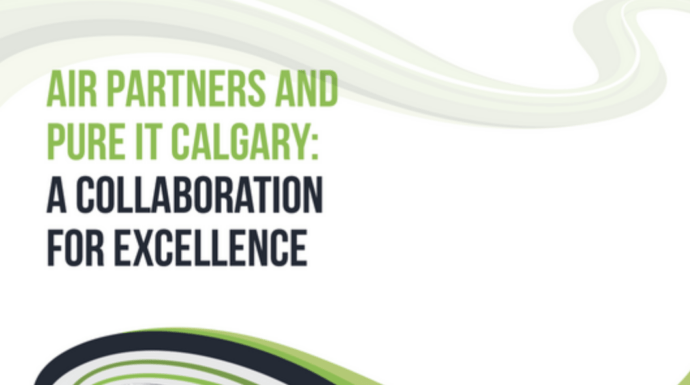Cyber Resilience in Alberta’s Oil & Gas Sector: Strengthening Industry Security Measures
The world of oil and gas has always been at the forefront of technological innovation, driving the transformation of global economies. As the industry continues to evolve, it faces growing challenges in maintaining robust cybersecurity standards to protect its valuable assets and infrastructure. In this new era of fast-paced technological change, your organization must stay ahead by identifying potential threats, mitigating risks, and embedding core cyber resilience principles.
The oil and gas sector’s rapid digitalization opens up new opportunities for efficiency and growth and exposes companies to increased risks of cyberattacks. The World Economic Forum’s Cyber Resilience in Oil and Gas initiative underscores the need for a collaborative approach to tackling these challenges. This multidisciplinary effort involves various stakeholders from the oil and gas and ICT industries, recognizing that achieving effective cyber resilience requires a cohesive business and digital enablement strategy.
As you navigate this dynamic environment, staying informed about the latest developments in cybersecurity and cyber resilience is essential. By doing so, you can protect your company’s critical data and infrastructure, safeguarding the broader ecosystem of the oil and gas industry and ultimately strengthening your organization’s ability to withstand and recover from potential cyber incidents.
The Importance of Cyber Resilience in the Oil and Gas Industry
Critical Infrastructure Protection
As a critical infrastructure, the oil and gas industry powers the global economy and is vital to national security. Protecting this part of the critical infrastructure is essential for maintaining people’s security and society’s stability. You should be aware that cyberattacks targeting the oil and gas sector have increased frequency, sophistication, and impact as the industry employs more connected technology. This necessitates a focus on building cyber resilience and collective defense systems across the industry, upholding common standards, and protecting partner supply chains.
Economic and Financial Implications
Cyber risk’s economic and financial implications in the oil and gas industry can be significant. A successful cyberattack could disrupt timely customer fuel deliveries, cause reputational damage, and lead to substantial financial losses. To mitigate these risks, your organization should:
- Embed cyber resilience in your business culture and operating models.
- Adopt a systemic approach to risk management by collaborating with other stakeholders in the industry.
- Emphasize the importance of strong cybersecurity to your board, as O&G boards have generally shown limited strategic appreciation of cyber issues.
Political and Environmental Aspects
Lastly, it is crucial to consider the political and environmental aspects of cyber resilience in the oil and gas industry:
- Political ramifications: Cyberattacks can undermine trust between countries and result in geopolitical tensions, especially when state-sponsored actors are involved. Collaborating on international efforts, such as the World Economic Forum’s Cyber Resilience in Oil & Gas initiative, can foster international cooperation and dialogue between public and private sector leaders.
- Environmental impact: Cyber incidents have the potential to cause significant environmental damage if, for example, a successful attack leads to an oil spill. Thus, strong cybersecurity measures are not only crucial for your organization’s financial well-being but also for protecting the environment and communities surrounding your operations.
By addressing and understanding these critical infrastructures, economic, financial, and political, and environmental aspects, you can better equip your organization to tackle the challenges associated with cyber risk in the oil and gas industry.
Challenges and Cyber Risks
Operational Technology Security
Operational technology (OT) is critical to your oil and gas infrastructure. These systems control physical processes and are often connected to information technology (IT) systems. It is vital to ensure the security of your OT systems, as they are a prime target for cyberattacks. Secure OT systems by:
- Segregating OT and IT networks to minimize the risk of unauthorized access
- Implementing strong access controls and authentication mechanisms
- Regularly monitoring and updating security patches in OT systems
Ransomware Attacks
Ransomware attacks pose a significant threat to your oil and gas operations. These attacks involve encrypting your critical data and demanding ransom for the decryption key. To protect your organization from ransomware attacks:
- Educate employees on phishing emails and safe browsing practices
- Regularly backup data and store it in a secure location
- Implement advanced threat detection and response tools
Digitalization and Information Systems
The oil and gas industry’s increasing digitalization and interconnectedness have heightened cyber risks. The reliance on advanced information systems opens avenues for cyberattacks that can lead to operational disruptions, economic losses, and reputation damage. To address these risks:
- Develop a comprehensive cybersecurity strategy that covers all aspects of your digital infrastructure
- Establish strong governance practices and allocate appropriate resources for cybersecurity
- Collaborate with industry peers and government agencies to stay informed on the latest threats and best practices
By being proactive about cybersecurity, you can better protect your organization from the growing cyber risks in the oil and gas industry.
Cyber Resilience Principles and Strategies
World Economic Forum’s Cyber Resilience Playbook
The World Economic Forum’s (WEF) Cyber Resilience in Oil & Gas initiative has outlined a playbook for boards and corporate officers. This playbook focuses on:
- Implementing cyber resilience principles for the oil and gas industry
- Fostering a culture of cyber resilience within the organization
- Establishing a governance model that incorporates cyber resilience from the top down
Your organization must adopt these principles and ensure that your team members, especially non-technical leaders, acknowledge the need for a cyber-resilient organization.
Holistic Risk Management Approach
You must adopt a holistic risk management approach to protect your organization from the evolving threats of cyber attacks. This entails the following:
- Assessing the risk landscape, including potential threats and vulnerabilities within your organization
- Implementing a comprehensive risk mitigation strategy that addresses the most pressing risks
- Regularly monitoring, updating, and refining your risk management strategies and processes
Adopting a proactive approach to risk management can ensure your organization stays prepared to counter digital threats and maintain operational continuity in the face of potential disruptions.
Ecosystem-Wide Collaboration
Developing effective cyber resilience plans requires input from multiple stakeholders across the industry. As the oil and gas sector is interconnected, ecosystem-wide collaboration is vital for mitigating risks and ensuring a unified response against cyber attacks. Key aspects of this collaboration include:
- Engaging in dialogues with public and private sector leaders to identify and address common challenges
- Sharing best practices and threat intelligence among organizations to improve awareness and preparedness
- Initiating joint efforts to develop industry-specific cybersecurity guidelines and standards
By participating in this collective effort, your organization can contribute to a more secure and resilient oil and gas industry, benefiting from the shared knowledge and resources across the ecosystem.
Promoting a Cyber Resilient Culture
Corporate Governance and Board Members’ Roles
As a board member or leader in the oil and gas industry, your role is crucial in promoting a cyber resilient culture. You should ensure effective corporate governance, focusing on transparency, accountability, and responsible oversight. You can facilitate open communication and collaboration between IT, security, and risk management departments to strengthen your organization’s cyber defenses. Furthermore, instill a culture of cyber awareness among employees and regularly update your company’s cybersecurity policies.
Effective Cybersecurity Practices
Your organization should implement comprehensive, proactive cybersecurity practices to protect critical infrastructure and data. Some effective measures include:
- Regularly assess your company’s vulnerabilities and potential threats.
- Implement secure data storage and backup systems, as well as encryption.
- Establish an incident response plan and conduct regular emergency simulations.
- Promote cybersecurity training and awareness programs for employees.
- Continuously update and improve your cybersecurity measures based on the evolving threat landscape.
Collective Resilience Efforts
To enhance your oil and gas company’s cyber resilience, engaging in collective action across the industry is essential. You can do this by participating in industry-wide initiatives such as the Cyber Resilience Pledge, which promotes knowledge sharing and harmonizes cybersecurity practices. Collaborating with organizations like the Centre for Cybersecurity and other industries helps develop unified approaches and fosters information-sharing about emerging risks and best practices. By joining forces, you can create a stronger, more resilient oil and gas sector against cyber attacks.
Technology and Partnerships for Cyber Resilience
Siemens Energy and Industrial Cybersecurity
Pure IT offers solutions to enhance your industrial cybersecurity posture. They recognize the importance of securing your energy infrastructure, as cyber criminals may target transportation, refining, and other key processes within the oil and gas sector. As part of its commitment to resilience by design, Pure IT works to ensure that your information systems are protected from potential cyber-attacks.
To achieve this, Pure IT provides tailored cybersecurity solutions addressing specific risks and challenges within your organization. These solutions include:
- Security assessments and audits
- Network segmentation and architecture services
- Endpoint and server protection
- Security information and event management (SIEM)
Partnering with Pure IT can strengthen your organization’s cyber resilience and mitigate potential vulnerabilities.
Pure IT Cybersecurity Exercises
Pure IT offers cybersecurity exercises specifically designed for the oil and gas industry. These exercises help your organization identify and address potential vulnerabilities in your technology and operational processes. By participating in these exercises, your organization will gain valuable insights into potential attack scenarios and be better prepared to respond to cyber threats.
Pure IT’s cybersecurity exercises typically consist of the following steps:
- Threat scenario planning and design
- Facilitated exercise with your team members
- Debriefing and analysis of the exercise outcomes
- Recommendations for improvements and follow-up actions
These exercises can enhance your organization’s cyber resilience and fortify your information systems, ensuring your critical operations are not compromised.
Community and Industry Collaborations
Collaborating with other organizations and industry stakeholders can significantly improve your cyber resilience. By sharing knowledge, best practices, and threat intelligence, you can strengthen your cybersecurity posture and the resilience of the entire oil and gas sector.
To foster greater cooperation and collaboration, consider participating in industry forums, professional associations, and working groups focused on cybersecurity. Engaging with these services can gain valuable insights, access resources, and foster relationships that will contribute to your organization’s overall cyber resilience.
In conclusion, investing in technology and partnerships for cyber resilience is essential for safeguarding your organization’s critical assets within the oil and gas sector. By actively engaging with industry stakeholders, implementing cybersecurity best practices, and leveraging solutions from providers like Pure IT, you can mitigate potential risks and ensure the ongoing security of your operations.
Why Hire Pure IT To Oversee Your Cyber Strategies
Alberta-Based Cyber Professionals
When protecting your Oil & Gas assets, partnering with Pure IT ensures you are working with a team of local Alberta-based cyber professionals. They understand the nuances and unique challenges faced by the industry in the region. By choosing a local team, you can expect the following:
- Quicker response times during critical situations
- A greater understanding of local regulations and compliance requirements
- Tailored solutions specifically designed for your industry
This local expertise translates into a more robust and efficient cyber strategy tailored to your needs.
Industry Leaders In Digital Transformation
The Oil & Gas industry is undergoing a digital transformation, making the need for advanced cybersecurity strategies more important than ever. Pure IT is a recognized leader in navigating and implementing digital transformation processes. By partnering with them, you benefit from the following:
- Their expertise in the latest cybersecurity technologies
- Comprehensive knowledge of industry best practices
- A proactive approach to threat identification and management
With Pure IT overseeing your cyber strategies, your organization will stay ahead of emerging cyber threats and maintain a competitive edge.
Professionally Managed Outsourced Cyber & Technology Firm
Pure IT is a cybersecurity service provider and a completely outsourced cyber & technology firm. This means they offer a comprehensive suite of services that enable you to focus on your core business while they handle your cyber strategies. Services include:
| Service Area | Benefits |
|---|---|
| Managed IT services | 24/7 monitoring, support, and maintenance |
| Risk assessments | Identify vulnerabilities and mitigate risks |
| Compliance management | Stay up-to-date with industry regulations |
| Disaster recovery | Minimize downtime and loss of data during incidents |
Opting for a professional outsourced firm like Pure IT means receiving top-notch cybersecurity support, continuous monitoring, and effective risk mitigation. With their assistance, your organization will be better prepared and capable of reacting to cybersecurity threats.





